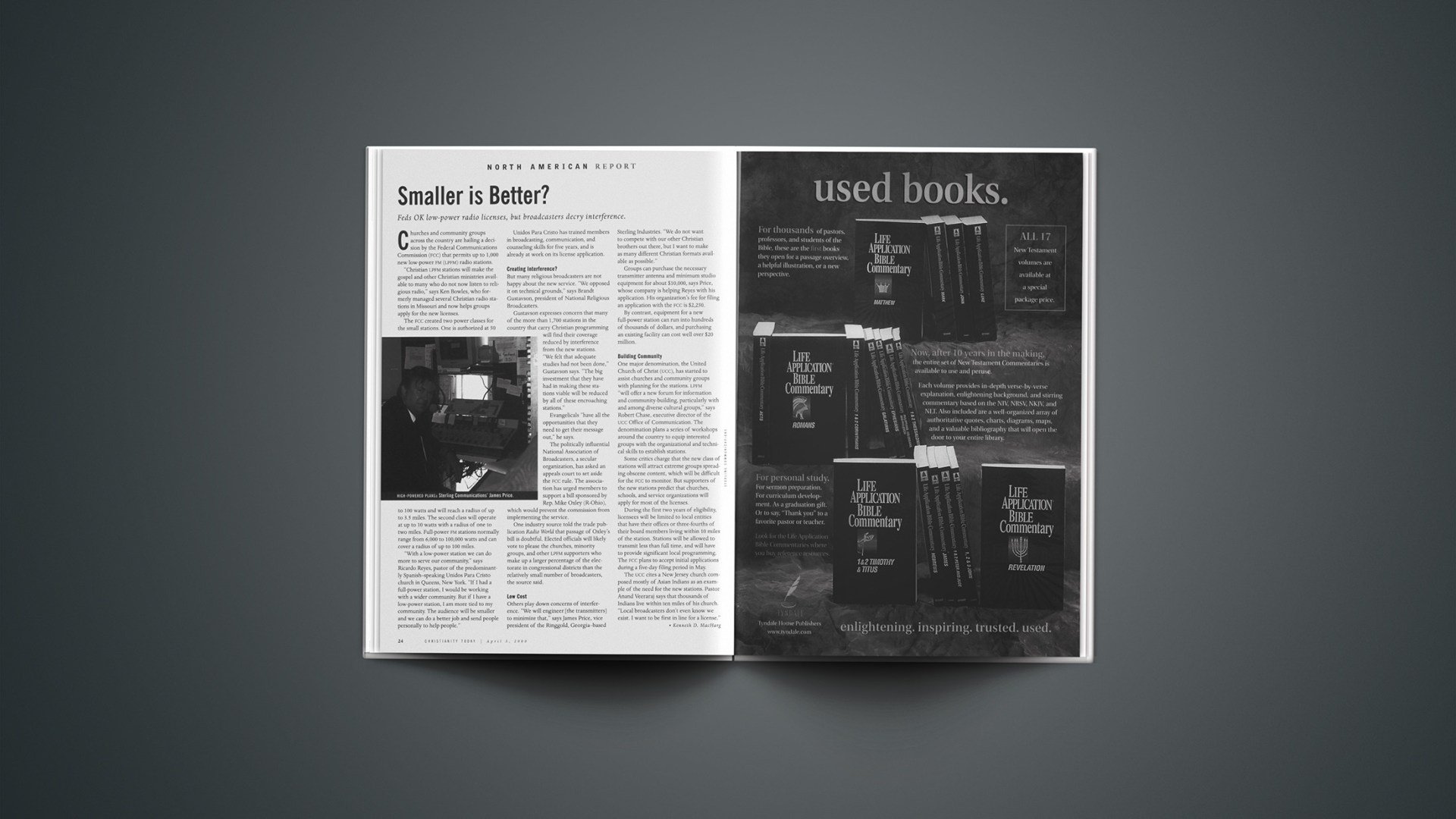Churches and community groups across the country are hailing a decision by the Federal Communications Commission (FCC) that permits up to 1,000 new low-power FM (LPFM) radio stations.
“Christian LPFM stations will make the gospel and other Christian ministries available to many who do not now listen to religious radio,” says Ken Bowles, who formerly managed several Christian radio stations in Missouri and now helps groups apply for the new licenses.
The FCC created two power classes for the small stations. One is authorized at 50 to 100 watts and will reach a radius of up to 3.5 miles. The second class will operate at up to 10 watts with a radius of one to two miles. Full-power FM stations normally range from 6,000 to 100,000 watts and can cover a radius of up to 100 miles.
“With a low-power station we can do more to serve our community,” says Ricardo Reyes, pastor of the predominately Spanish-speaking Unidos Para Cristo church in Queens, New York. “If I had a full-power station, I would be working with a wider community. But if I have a low-power station, I am more tied to my community. The audience will be smaller and we can do a better job and send people personally to help people.”
Unidos Para Cristo has trained members in broadcasting, communication, and counseling skills for five years, and is already at work on its license application.
Creating Interference?
But many religious broadcasters are not happy about the new service. “We opposed it on technical grounds,” says Brandt Gustavson, president of National Religious Broadcasters.
Gustavson expresses concern that many of the more than 1,700 stations in the country that carry Christian programming will find their coverage reduced by interference from the new stations.
“We felt that adequate studies had not been done,” Gustavson says. “The big investment that they have had in making these stations viable will be reduced by all of these encroaching stations.
“Evangelicals “have all the opportunities that they need to get their message out,” he says.
The politically influential National Association of Broadcasters, a secular organization, has asked an appeals court to set aside the FCC rule. The association has urged members to support a bill sponsored by Rep. Mike Oxley (R-Ohio), which would prevent the commission from implementing the service.
One industry source told the trade publication Radio World that passage of Oxley’s bill is doubtful. Elected officials will likely vote to please the churches, minority groups, and other LPFM supporters who make up a larger percentage of the electorate in congressional districts than the relatively small number of broadcasters, the source said.
Low Cost
Others play down concerns of interference. “We will engineer [the transmitters] to minimize that,” says James Price, vice president of the Ringgold, Georgia-based Sterling Industries. “We do not want to compete with our other Christian brothers out there, but I want to make as many different Christian formats available as possible.”
Groups can purchase the necessary transmitter antenna and minimum studio equipment for about $10,000, says Price, whose company is helping Reyes with his application. His organization’s fee for filing an application with the FCC is $2,250.
By contrast, equipment for a new full-power station can run into hundreds of thousands of dollars, and purchasing an existing facility can cost well over $20 million.
Building Community
One major denomination, the United Church of Christ (UCC), has started to assist churches and community groups with planning for the stations. LPFM “will offer a new forum for information and community-building, particularly with and among diverse cultural groups,” says Robert Chase, executive director of the UCC Office of Communication. The denomination plans a series of workshops around the country to equip interested groups with the organizational and technical skills to establish stations.
Some critics charge that the new class of stations will attract extreme groups spreading obscene content, which will be difficult for the FCC to monitor. But supporters of the new stations predict that mostly churches, schools, and service organizations will apply for the licenses.
During the first two years of eligibility, licensees will be limited to local entities that have their offices or three-fourths of their board members living within 10 miles of the station. Stations will be allowed to transmit less than full time, and will have to provide significant local programming. The FCC plans to accept initial applications during a five-day filing period in May.
The UCC cites a New Jersey church composed mostly of Asian Indians as an example of the need for the new stations. Pastor Anand Veeraraj says that thousands of Indians live within ten miles of his church. “Local broadcasters don’t even know we exist. I want to be first in line for a license.”
Related Elsewhere
The FCC‘s site on LPFM includes a fact sheet, a Frequently Asked Questions (FAQ) page, and the entire text of the commission’s report and order.
The NRB’s statement against LPFM is online, though you’ll have to scroll past many other press releases to find it.
LPFM.com has more legal and technical information about future of low-power radio.
Copyright © 2000 Christianity Today. Click for reprint information.










